University's Early Childhood Education and Care: Personal Philosophy
VerifiedAdded on 2021/04/21
|6
|1181
|365
Essay
AI Summary
This essay outlines a personal philosophy on early childhood education and care, emphasizing the importance of relationships, respect, and responsibility in fostering lifelong learning. The author's vision centers on creating nurturing environments where children develop essential skills, supported by theories such as Bowlby's attachment theory and Vygotsky's socio-cultural theory. The essay details the integration of the Early Years Learning Framework, the significance of natural play, and the use of strength-based assessments. It also addresses the roles of educators, families, and the community in supporting child development, highlighting the importance of communication, collaboration, and understanding of each child's unique strengths and needs. The essay also makes use of references from different authors to support their philosophy.
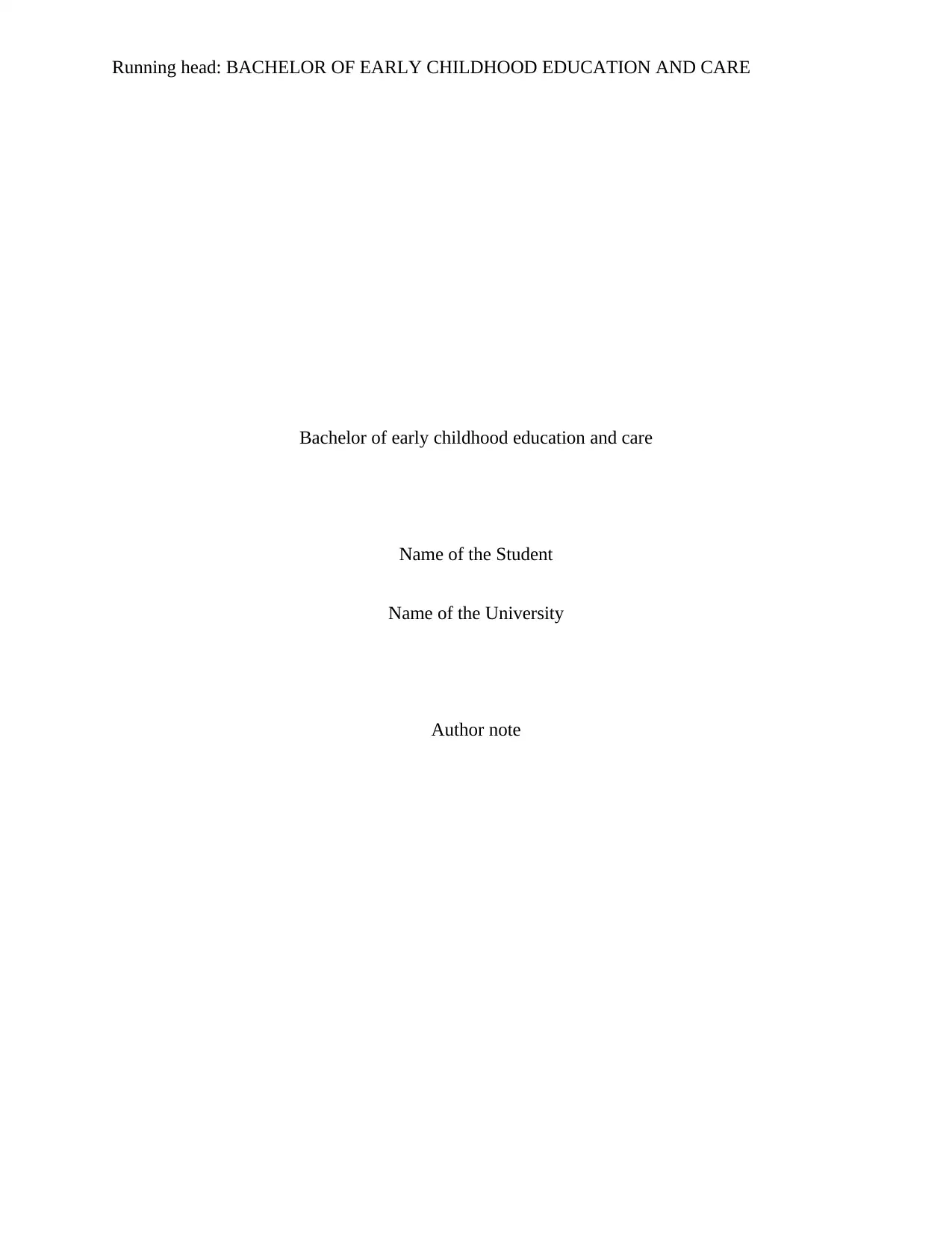
Running head: BACHELOR OF EARLY CHILDHOOD EDUCATION AND CARE
Bachelor of early childhood education and care
Name of the Student
Name of the University
Author note
Bachelor of early childhood education and care
Name of the Student
Name of the University
Author note
Paraphrase This Document
Need a fresh take? Get an instant paraphrase of this document with our AI Paraphraser
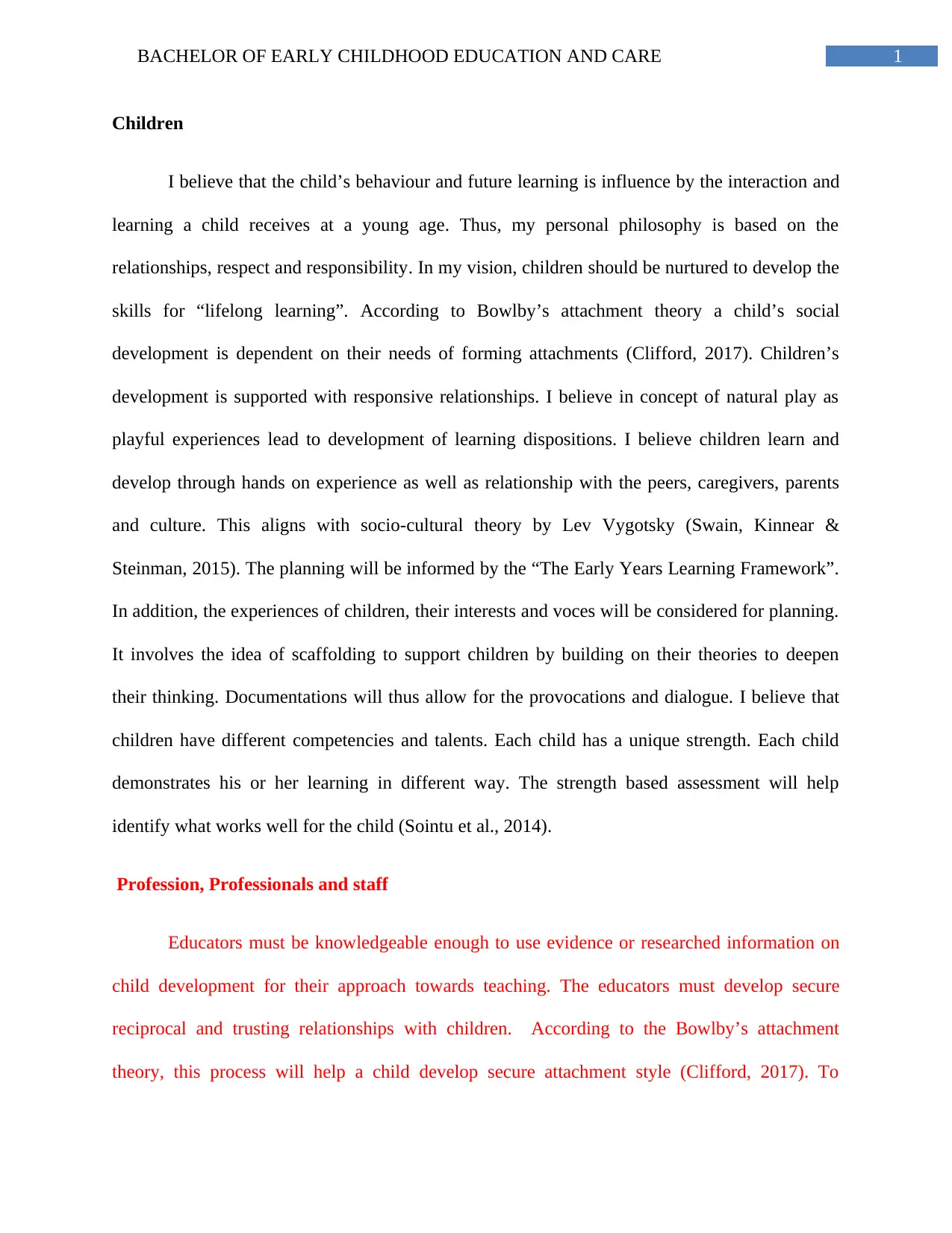
1BACHELOR OF EARLY CHILDHOOD EDUCATION AND CARE
Children
I believe that the child’s behaviour and future learning is influence by the interaction and
learning a child receives at a young age. Thus, my personal philosophy is based on the
relationships, respect and responsibility. In my vision, children should be nurtured to develop the
skills for “lifelong learning”. According to Bowlby’s attachment theory a child’s social
development is dependent on their needs of forming attachments (Clifford, 2017). Children’s
development is supported with responsive relationships. I believe in concept of natural play as
playful experiences lead to development of learning dispositions. I believe children learn and
develop through hands on experience as well as relationship with the peers, caregivers, parents
and culture. This aligns with socio-cultural theory by Lev Vygotsky (Swain, Kinnear &
Steinman, 2015). The planning will be informed by the “The Early Years Learning Framework”.
In addition, the experiences of children, their interests and voces will be considered for planning.
It involves the idea of scaffolding to support children by building on their theories to deepen
their thinking. Documentations will thus allow for the provocations and dialogue. I believe that
children have different competencies and talents. Each child has a unique strength. Each child
demonstrates his or her learning in different way. The strength based assessment will help
identify what works well for the child (Sointu et al., 2014).
Profession, Professionals and staff
Educators must be knowledgeable enough to use evidence or researched information on
child development for their approach towards teaching. The educators must develop secure
reciprocal and trusting relationships with children. According to the Bowlby’s attachment
theory, this process will help a child develop secure attachment style (Clifford, 2017). To
Children
I believe that the child’s behaviour and future learning is influence by the interaction and
learning a child receives at a young age. Thus, my personal philosophy is based on the
relationships, respect and responsibility. In my vision, children should be nurtured to develop the
skills for “lifelong learning”. According to Bowlby’s attachment theory a child’s social
development is dependent on their needs of forming attachments (Clifford, 2017). Children’s
development is supported with responsive relationships. I believe in concept of natural play as
playful experiences lead to development of learning dispositions. I believe children learn and
develop through hands on experience as well as relationship with the peers, caregivers, parents
and culture. This aligns with socio-cultural theory by Lev Vygotsky (Swain, Kinnear &
Steinman, 2015). The planning will be informed by the “The Early Years Learning Framework”.
In addition, the experiences of children, their interests and voces will be considered for planning.
It involves the idea of scaffolding to support children by building on their theories to deepen
their thinking. Documentations will thus allow for the provocations and dialogue. I believe that
children have different competencies and talents. Each child has a unique strength. Each child
demonstrates his or her learning in different way. The strength based assessment will help
identify what works well for the child (Sointu et al., 2014).
Profession, Professionals and staff
Educators must be knowledgeable enough to use evidence or researched information on
child development for their approach towards teaching. The educators must develop secure
reciprocal and trusting relationships with children. According to the Bowlby’s attachment
theory, this process will help a child develop secure attachment style (Clifford, 2017). To
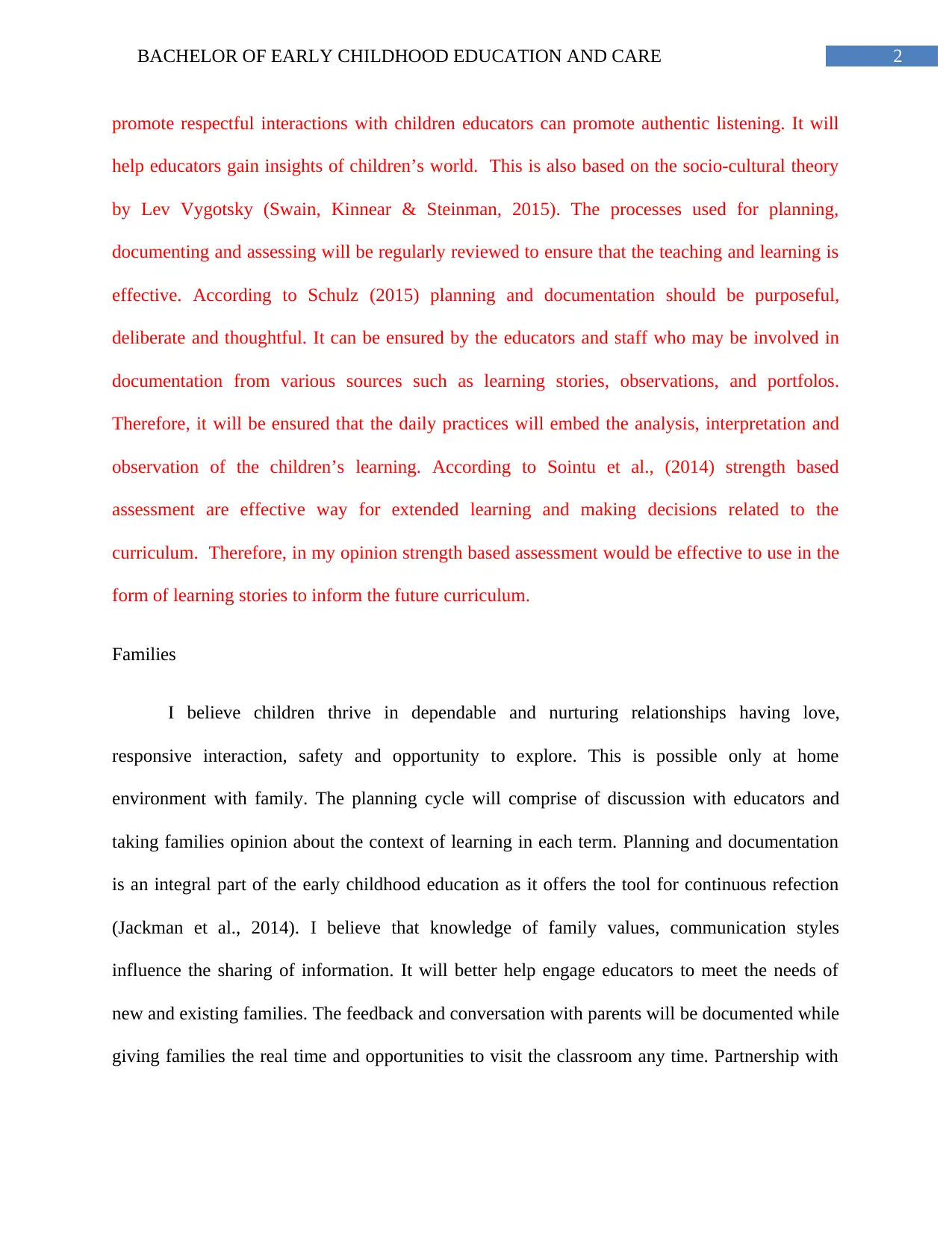
2BACHELOR OF EARLY CHILDHOOD EDUCATION AND CARE
promote respectful interactions with children educators can promote authentic listening. It will
help educators gain insights of children’s world. This is also based on the socio-cultural theory
by Lev Vygotsky (Swain, Kinnear & Steinman, 2015). The processes used for planning,
documenting and assessing will be regularly reviewed to ensure that the teaching and learning is
effective. According to Schulz (2015) planning and documentation should be purposeful,
deliberate and thoughtful. It can be ensured by the educators and staff who may be involved in
documentation from various sources such as learning stories, observations, and portfolos.
Therefore, it will be ensured that the daily practices will embed the analysis, interpretation and
observation of the children’s learning. According to Sointu et al., (2014) strength based
assessment are effective way for extended learning and making decisions related to the
curriculum. Therefore, in my opinion strength based assessment would be effective to use in the
form of learning stories to inform the future curriculum.
Families
I believe children thrive in dependable and nurturing relationships having love,
responsive interaction, safety and opportunity to explore. This is possible only at home
environment with family. The planning cycle will comprise of discussion with educators and
taking families opinion about the context of learning in each term. Planning and documentation
is an integral part of the early childhood education as it offers the tool for continuous refection
(Jackman et al., 2014). I believe that knowledge of family values, communication styles
influence the sharing of information. It will better help engage educators to meet the needs of
new and existing families. The feedback and conversation with parents will be documented while
giving families the real time and opportunities to visit the classroom any time. Partnership with
promote respectful interactions with children educators can promote authentic listening. It will
help educators gain insights of children’s world. This is also based on the socio-cultural theory
by Lev Vygotsky (Swain, Kinnear & Steinman, 2015). The processes used for planning,
documenting and assessing will be regularly reviewed to ensure that the teaching and learning is
effective. According to Schulz (2015) planning and documentation should be purposeful,
deliberate and thoughtful. It can be ensured by the educators and staff who may be involved in
documentation from various sources such as learning stories, observations, and portfolos.
Therefore, it will be ensured that the daily practices will embed the analysis, interpretation and
observation of the children’s learning. According to Sointu et al., (2014) strength based
assessment are effective way for extended learning and making decisions related to the
curriculum. Therefore, in my opinion strength based assessment would be effective to use in the
form of learning stories to inform the future curriculum.
Families
I believe children thrive in dependable and nurturing relationships having love,
responsive interaction, safety and opportunity to explore. This is possible only at home
environment with family. The planning cycle will comprise of discussion with educators and
taking families opinion about the context of learning in each term. Planning and documentation
is an integral part of the early childhood education as it offers the tool for continuous refection
(Jackman et al., 2014). I believe that knowledge of family values, communication styles
influence the sharing of information. It will better help engage educators to meet the needs of
new and existing families. The feedback and conversation with parents will be documented while
giving families the real time and opportunities to visit the classroom any time. Partnership with
⊘ This is a preview!⊘
Do you want full access?
Subscribe today to unlock all pages.

Trusted by 1+ million students worldwide
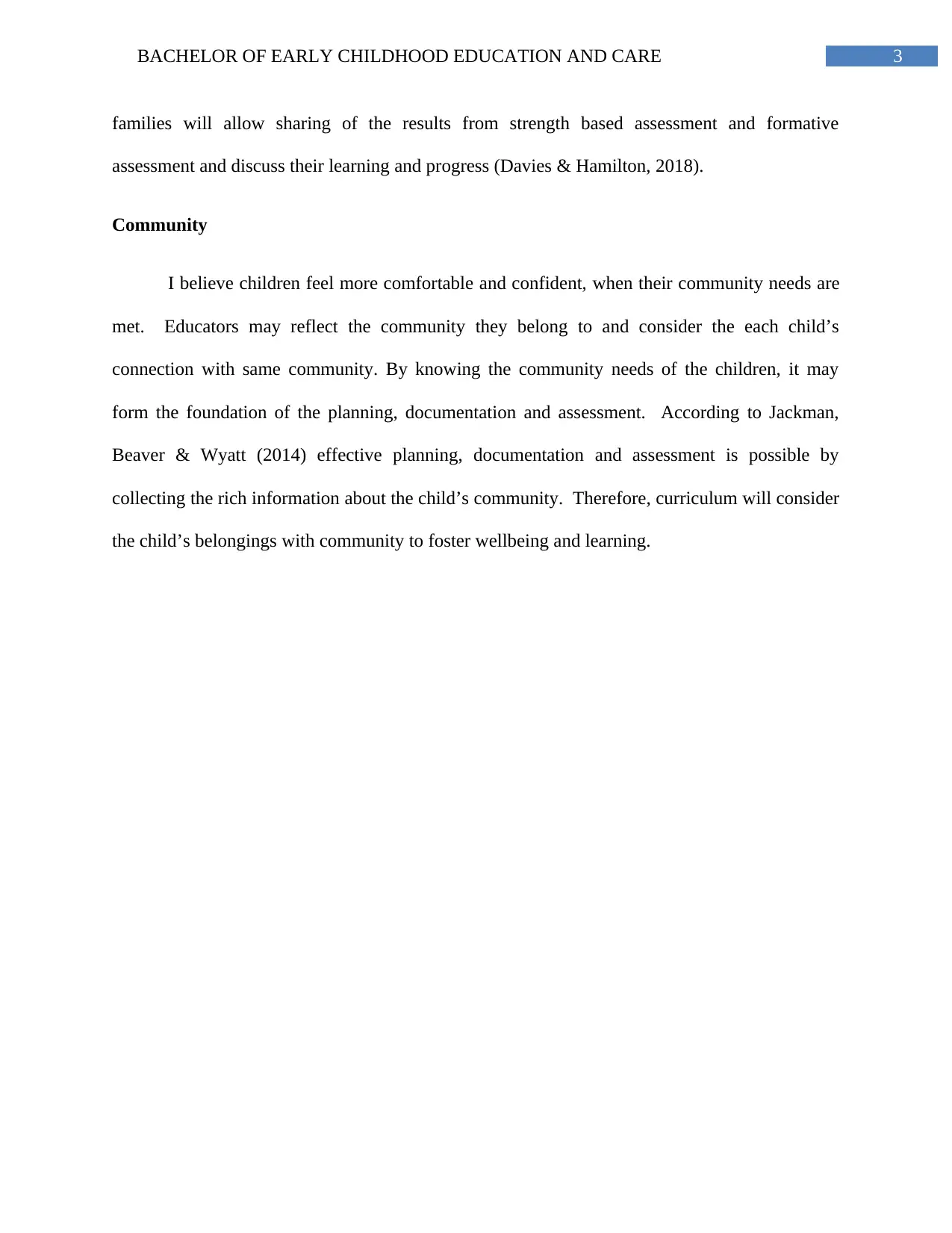
3BACHELOR OF EARLY CHILDHOOD EDUCATION AND CARE
families will allow sharing of the results from strength based assessment and formative
assessment and discuss their learning and progress (Davies & Hamilton, 2018).
Community
I believe children feel more comfortable and confident, when their community needs are
met. Educators may reflect the community they belong to and consider the each child’s
connection with same community. By knowing the community needs of the children, it may
form the foundation of the planning, documentation and assessment. According to Jackman,
Beaver & Wyatt (2014) effective planning, documentation and assessment is possible by
collecting the rich information about the child’s community. Therefore, curriculum will consider
the child’s belongings with community to foster wellbeing and learning.
families will allow sharing of the results from strength based assessment and formative
assessment and discuss their learning and progress (Davies & Hamilton, 2018).
Community
I believe children feel more comfortable and confident, when their community needs are
met. Educators may reflect the community they belong to and consider the each child’s
connection with same community. By knowing the community needs of the children, it may
form the foundation of the planning, documentation and assessment. According to Jackman,
Beaver & Wyatt (2014) effective planning, documentation and assessment is possible by
collecting the rich information about the child’s community. Therefore, curriculum will consider
the child’s belongings with community to foster wellbeing and learning.
Paraphrase This Document
Need a fresh take? Get an instant paraphrase of this document with our AI Paraphraser
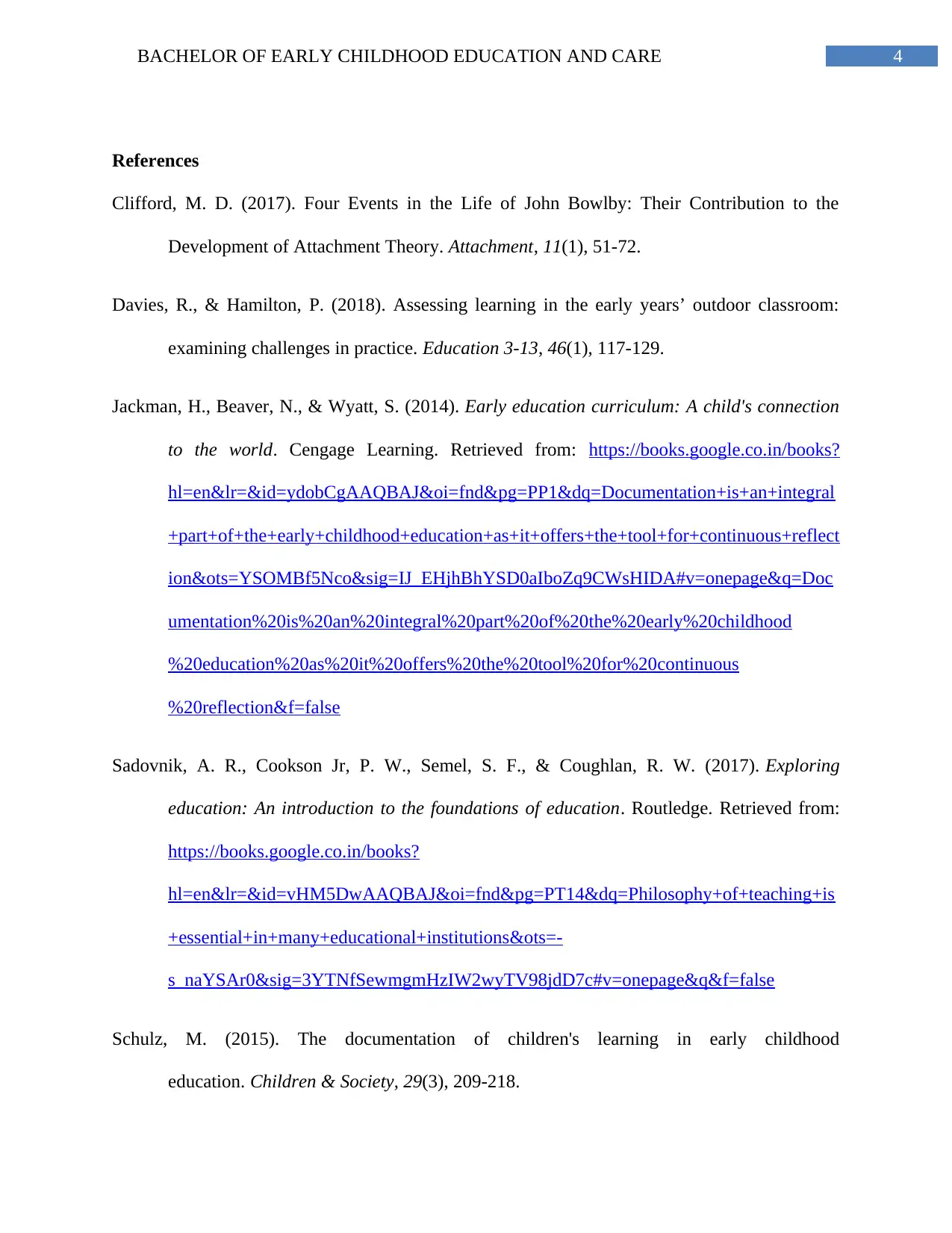
4BACHELOR OF EARLY CHILDHOOD EDUCATION AND CARE
References
Clifford, M. D. (2017). Four Events in the Life of John Bowlby: Their Contribution to the
Development of Attachment Theory. Attachment, 11(1), 51-72.
Davies, R., & Hamilton, P. (2018). Assessing learning in the early years’ outdoor classroom:
examining challenges in practice. Education 3-13, 46(1), 117-129.
Jackman, H., Beaver, N., & Wyatt, S. (2014). Early education curriculum: A child's connection
to the world. Cengage Learning. Retrieved from: https://books.google.co.in/books?
hl=en&lr=&id=ydobCgAAQBAJ&oi=fnd&pg=PP1&dq=Documentation+is+an+integral
+part+of+the+early+childhood+education+as+it+offers+the+tool+for+continuous+reflect
ion&ots=YSOMBf5Nco&sig=IJ_EHjhBhYSD0aIboZq9CWsHIDA#v=onepage&q=Doc
umentation%20is%20an%20integral%20part%20of%20the%20early%20childhood
%20education%20as%20it%20offers%20the%20tool%20for%20continuous
%20reflection&f=false
Sadovnik, A. R., Cookson Jr, P. W., Semel, S. F., & Coughlan, R. W. (2017). Exploring
education: An introduction to the foundations of education. Routledge. Retrieved from:
https://books.google.co.in/books?
hl=en&lr=&id=vHM5DwAAQBAJ&oi=fnd&pg=PT14&dq=Philosophy+of+teaching+is
+essential+in+many+educational+institutions&ots=-
s_naYSAr0&sig=3YTNfSewmgmHzIW2wyTV98jdD7c#v=onepage&q&f=false
Schulz, M. (2015). The documentation of children's learning in early childhood
education. Children & Society, 29(3), 209-218.
References
Clifford, M. D. (2017). Four Events in the Life of John Bowlby: Their Contribution to the
Development of Attachment Theory. Attachment, 11(1), 51-72.
Davies, R., & Hamilton, P. (2018). Assessing learning in the early years’ outdoor classroom:
examining challenges in practice. Education 3-13, 46(1), 117-129.
Jackman, H., Beaver, N., & Wyatt, S. (2014). Early education curriculum: A child's connection
to the world. Cengage Learning. Retrieved from: https://books.google.co.in/books?
hl=en&lr=&id=ydobCgAAQBAJ&oi=fnd&pg=PP1&dq=Documentation+is+an+integral
+part+of+the+early+childhood+education+as+it+offers+the+tool+for+continuous+reflect
ion&ots=YSOMBf5Nco&sig=IJ_EHjhBhYSD0aIboZq9CWsHIDA#v=onepage&q=Doc
umentation%20is%20an%20integral%20part%20of%20the%20early%20childhood
%20education%20as%20it%20offers%20the%20tool%20for%20continuous
%20reflection&f=false
Sadovnik, A. R., Cookson Jr, P. W., Semel, S. F., & Coughlan, R. W. (2017). Exploring
education: An introduction to the foundations of education. Routledge. Retrieved from:
https://books.google.co.in/books?
hl=en&lr=&id=vHM5DwAAQBAJ&oi=fnd&pg=PT14&dq=Philosophy+of+teaching+is
+essential+in+many+educational+institutions&ots=-
s_naYSAr0&sig=3YTNfSewmgmHzIW2wyTV98jdD7c#v=onepage&q&f=false
Schulz, M. (2015). The documentation of children's learning in early childhood
education. Children & Society, 29(3), 209-218.
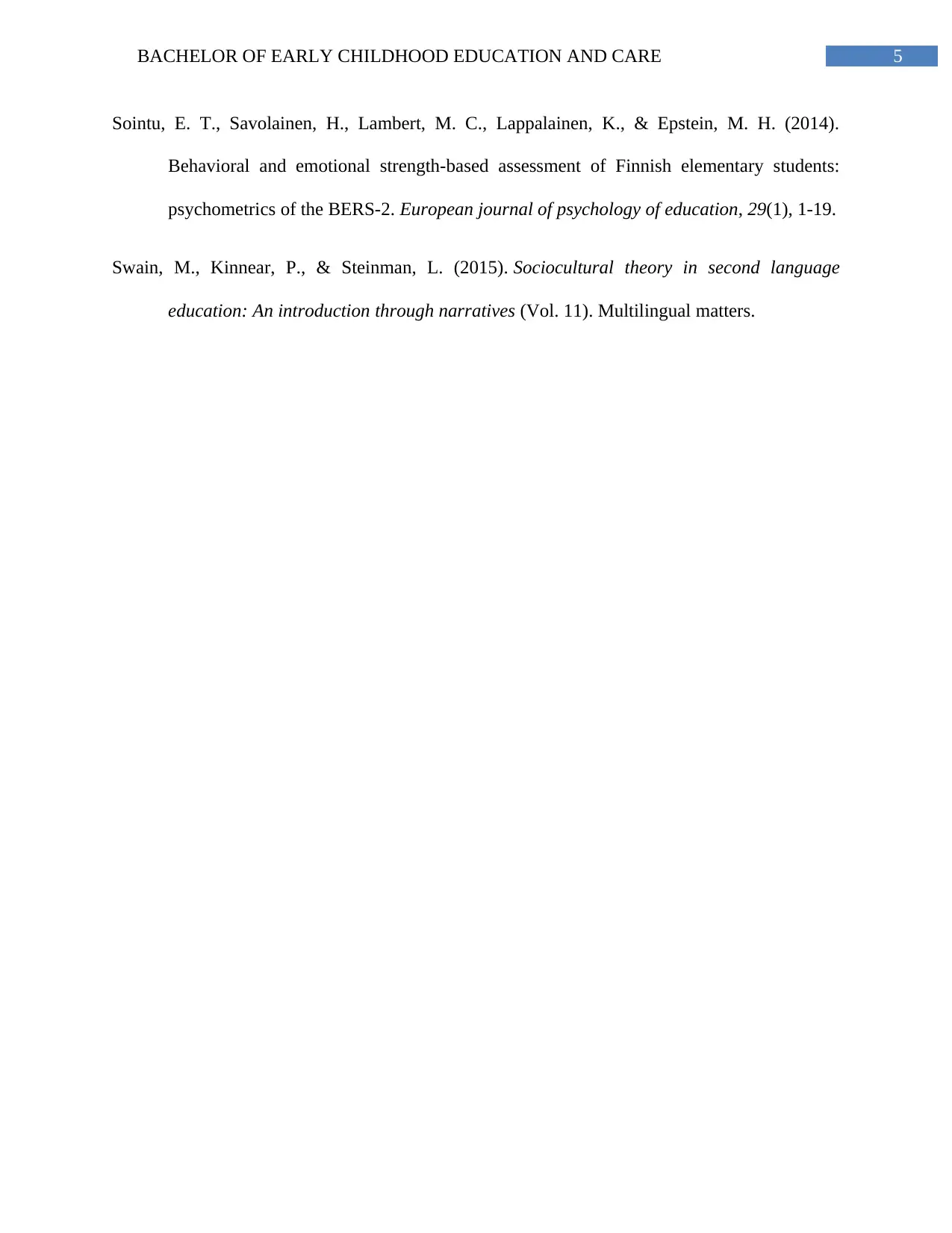
5BACHELOR OF EARLY CHILDHOOD EDUCATION AND CARE
Sointu, E. T., Savolainen, H., Lambert, M. C., Lappalainen, K., & Epstein, M. H. (2014).
Behavioral and emotional strength-based assessment of Finnish elementary students:
psychometrics of the BERS-2. European journal of psychology of education, 29(1), 1-19.
Swain, M., Kinnear, P., & Steinman, L. (2015). Sociocultural theory in second language
education: An introduction through narratives (Vol. 11). Multilingual matters.
Sointu, E. T., Savolainen, H., Lambert, M. C., Lappalainen, K., & Epstein, M. H. (2014).
Behavioral and emotional strength-based assessment of Finnish elementary students:
psychometrics of the BERS-2. European journal of psychology of education, 29(1), 1-19.
Swain, M., Kinnear, P., & Steinman, L. (2015). Sociocultural theory in second language
education: An introduction through narratives (Vol. 11). Multilingual matters.
⊘ This is a preview!⊘
Do you want full access?
Subscribe today to unlock all pages.

Trusted by 1+ million students worldwide
1 out of 6
Related Documents
Your All-in-One AI-Powered Toolkit for Academic Success.
+13062052269
info@desklib.com
Available 24*7 on WhatsApp / Email
![[object Object]](/_next/static/media/star-bottom.7253800d.svg)
Unlock your academic potential
Copyright © 2020–2026 A2Z Services. All Rights Reserved. Developed and managed by ZUCOL.





